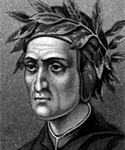Biography

The author of La Commedia (The Divine Comedy), considered a masterwork of world literature, Dante Alighieri was born Durante Alighieri in Florence, Italy, in 1265, to a notable family of modest means. His mother died when he was seven years old, and his father remarried, having two more children.
At twelve years old, Dante was betrothed to Gemma di Manetto Donati, though he had already fallen in love with another girl, Beatrice Portinari, who he continued to write about throughout his life, though his interaction with her was limited. The love poems to Beatrice are collected in Dante's La Vita Nuova, or The New Life.
In his youth, Dante studied many subjects, including Tuscan poetry, painting, and music. He encountered both the Occitan poetry of the troubadours and the Latin poetry of classical antiquity, including Homer and Virgil. He read Boethius's De consolatione philosophiae and Cicero's De amicitia. By the age of eighteen, Dante had met the poets Guido Cavalcanti, Lapo Gianni, Cino da Pistoia, and others. Along with Brunetto Latini, these poets became the leaders of Dolce Stil Novo ("The Sweet New Style"), in which personal and political passions were the purpose of poetry.
He later turned his attention to philosophy, which the character of Beatrice criticizes in Purgatorio. He also became a pharmacist, and in his twenties and thirties took an active part in local public affairs.
Like most Florentines during his lifetime, Dante was affected by the Guelph-Ghibelline conflict, a political division of loyalty between the Holy Roman Emperor and the Papacy. On June 11, 1289, he fought in the ranks at the battle of Campaldino on the side of the Guelphs, helping to bring forth a reformation of the Florentine constitution.
After defeating the Ghibellines, the Guelphs themselves divided into two factions: the White Guelphs, Dante's party, who were wary of the Pope's political influence; and the Black Guelphs, who remained loyal to Rome. Initially the Whites were in power and kicked the Blacks out of Florence, but Pope Boniface VIII planned a military occupation of the city. A delegation of Florentines, with Dante among them, was sent to Rome to ascertain the Pope's intentions.
While he was in Rome, the Black Guelphs destroyed much of the city, and established a new government. Dante received word that his assets had been seized and that he was considered an absconder, having left the city. Condemned to perpetual exile, Dante never returned to his beloved Florence. An outcast, Dante wandered Italy for several years, beginning to outline La Commedia, his great work.
In 1315, the military officer controlling Florence granted an amnesty to Florentines in exile, but the government of the city insisted that returning expatriots were required to pay a large fine and do public penance. Dante refused, preferring to remain in exile. Six years later, Dante died on September 13, 1321 in Ravenna, Italy, most likely of malarial fever.
Unlike the epic poems of Homer and Virgil, which told the great stories of their people's history, Dante's The Divine Comedy is a somewhat autobiographical work, set at the time in which he lived and peopled with contemporary figures. It follow's Dante's own allegorical journey through Hell (Inferno), Purgatory (Purgatorio), and Paradise (Paradiso). Guided at first by the character of Virgil, and later by his beloved Beatrice, Dante wrote of his own path to salvation, offering philosophical and moral judgments along the way.
Dante is credited with inventing terza rima, composed of tercets woven into a linked rhyme scheme, and chose to end each canto of the The Divine Comedy with a single line that completes the rhyme scheme with the end-word of the second line of the preceding tercet. The tripartite stanza likely symbolizes the Holy Trinity, and early enthusiasts of terza rima, including Italian poets Boccaccio and Petrarch, were particularly interested in the unifying effects of the form.
Also unlike the epic works that came before, The Divine Comedy was written in the vernacular Italian, instead of the more acceptable Latin or Greek. This allowed the work to be published to a much broader audience, contributing substantially to world literacy. Due to the monumental influence the work has had on countless artists, Dante is considered among the greatest writers to have lived. As the poet T. S. Eliot wrote, "Dante and Shakespeare divide the world between them, there is no third."
Last updated August 31, 2011



